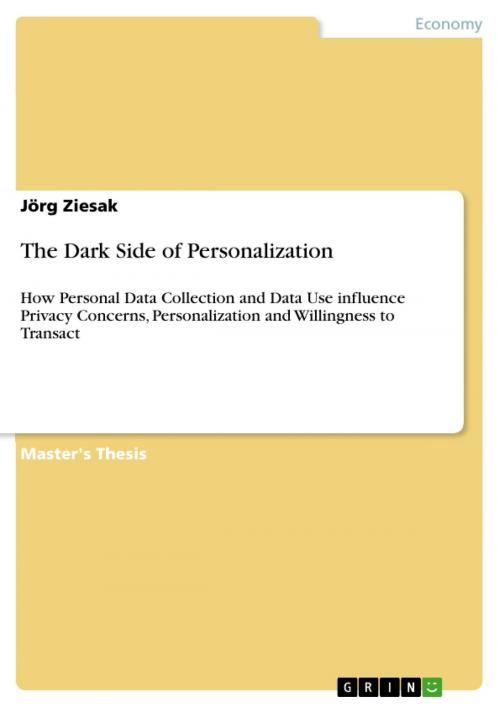The Dark Side of Personalization
How Personal Data Collection and Data Use influence Privacy Concerns, Personalization and Willingness to Transact
Business & Finance, Marketing & Sales| Author: | Jörg Ziesak | ISBN: | 9783656321576 |
| Publisher: | GRIN Verlag | Publication: | November 27, 2012 |
| Imprint: | GRIN Verlag | Language: | English |
| Author: | Jörg Ziesak |
| ISBN: | 9783656321576 |
| Publisher: | GRIN Verlag |
| Publication: | November 27, 2012 |
| Imprint: | GRIN Verlag |
| Language: | English |
Master's Thesis from the year 2012 in the subject Business economics - Marketing, Corporate Communication, CRM, Market Research, Social Media, grade: 1,2, Maastricht University, course: International Business - Strategic Marketing, language: English, abstract: 'Online Privacy Fears Stoked By Google, Twitter, Facebook Data Collection Arms Race', 'Your E-Book Is Reading You', ''Instant personalization' brings more privacy issues to Facebook'. These are only a few recent examples of media headlines dealing with the issue of online privacy and personalization. Scholars and managers have repeatedly stated the benefits of personalization, which is targeting products and services to individual customers and constitutes a key element of an interactive marketing strategy. To be able to accurately estimate the needs and wants of customers, it is necessary to gather a significant amount of information. Privacy concerns may arise when personal information about customers are gathered. If this arises, personalization can backfire by making clients reluctant to use the service or - even worse - developing a negative attitude towards the company. A recent survey by Opera Software (2011) found, that Americans fear online privacy violations more than job losses or declaring personal bankruptcy. This had induced politicians to introduce regulations and laws that address online privacy that safeguard consumers against online monitoring and intrusion into confidential user information. However, privacy online remains a complicated issue for both, managers and politicians, because new personalization technology emerges at a much faster pace than political regulations and guidelines. This study establishes a link between different types of data collection, data usage and concerns for information privacy. It also analyses the impact of privacy concerns on value, risk and usability perception of personalization and the users' willingness to transact with the website. It develops a conceptual framework and tests it by collecting responses to a questionnaire from an online-crowdsourcing sample of Amazon Mechanical Turk.
Master's Thesis from the year 2012 in the subject Business economics - Marketing, Corporate Communication, CRM, Market Research, Social Media, grade: 1,2, Maastricht University, course: International Business - Strategic Marketing, language: English, abstract: 'Online Privacy Fears Stoked By Google, Twitter, Facebook Data Collection Arms Race', 'Your E-Book Is Reading You', ''Instant personalization' brings more privacy issues to Facebook'. These are only a few recent examples of media headlines dealing with the issue of online privacy and personalization. Scholars and managers have repeatedly stated the benefits of personalization, which is targeting products and services to individual customers and constitutes a key element of an interactive marketing strategy. To be able to accurately estimate the needs and wants of customers, it is necessary to gather a significant amount of information. Privacy concerns may arise when personal information about customers are gathered. If this arises, personalization can backfire by making clients reluctant to use the service or - even worse - developing a negative attitude towards the company. A recent survey by Opera Software (2011) found, that Americans fear online privacy violations more than job losses or declaring personal bankruptcy. This had induced politicians to introduce regulations and laws that address online privacy that safeguard consumers against online monitoring and intrusion into confidential user information. However, privacy online remains a complicated issue for both, managers and politicians, because new personalization technology emerges at a much faster pace than political regulations and guidelines. This study establishes a link between different types of data collection, data usage and concerns for information privacy. It also analyses the impact of privacy concerns on value, risk and usability perception of personalization and the users' willingness to transact with the website. It develops a conceptual framework and tests it by collecting responses to a questionnaire from an online-crowdsourcing sample of Amazon Mechanical Turk.















